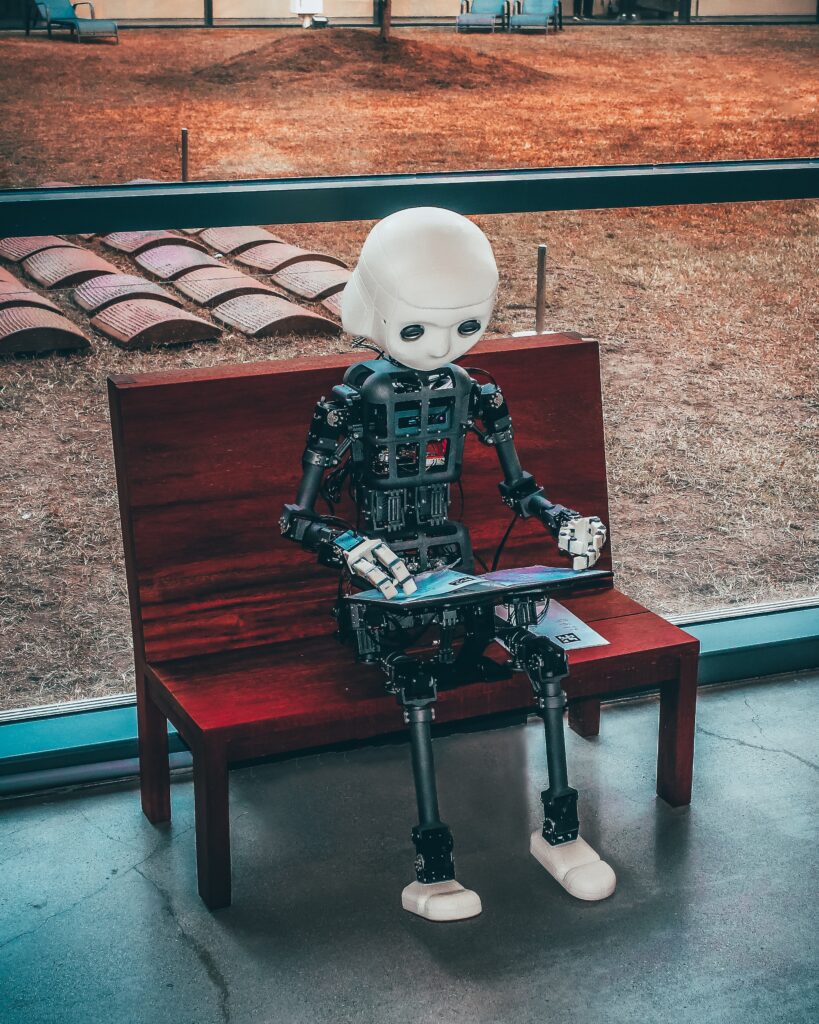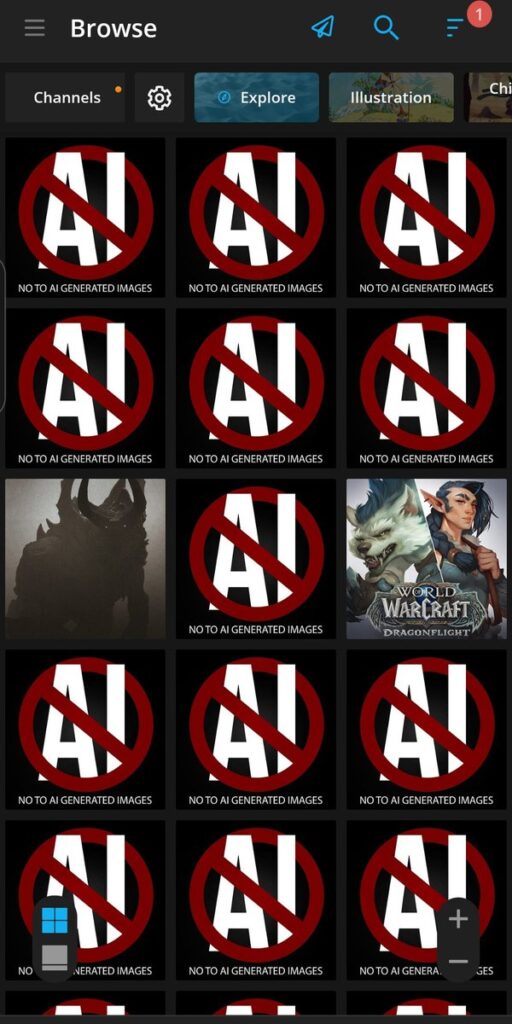Korean Twitter: Many have high hopes for the rosy future with generative AI. Generative AI is a type of artificial intelligence that produces a bevvy of content, ranging from texts to images. A representative AI product that we might be the most familiar with is ChatGPT from Open AI, released last November. Ready or not, generative AI is already being used across industries and reshaping businesses.
On the other hand, some are not so optimistic about generative AI’s possibilities. Their concerns include copyrights of the AI’s works, as their outputs are based on their collection of free searches scraped from the internet and the fear of being phased out due to the development of AI.
This sentiment is particularly noticeable on Twitter in South Korea, especially against AI image generators. Twitter is a platform where millions of fans from diverse genres, from animations to movies, conglomerate. Many of these fans, illustrators, and animators publicly criticise the use of AI tools in artworks.
In April, the Twitter account @grimguard2022 uploaded a series of posts protesting against the “injudicious use of AI image generators”. The account owner also promoted a public petition with the Korean National Assembly that demanded regulations on AI image generators, along with a message that “please help us to protect the rights of all creators”. The petition is now signed by 50,000 users online and is currently forwarded to responsible committees at the assembly.

AI Image Generator: Competitor or Partner?
Until seven years ago, Korea Employment Information Service named talents backed by creativity, such as writing or drawing, “irreplaceable jobs”. However, recent reports say the opposite. AI works are now winning internationally renowned photo competitions and art contests. Writing a short-form fiction or drama script is a less-than-a-minute job for Open AI’s ChatGPT.
AI is already reshaping the labour environment in the art industry, too. According to reports, over 70 per cent of the illustrators working with game companies in China have lost their jobs since the introduction of generative AI.
The reasoning behind this is simple – AI generates images of any order within seconds. If there are any awkward parts to be revised, that’s the work of human illustrators. As correcting the work of AI illustrators doesn’t take more time than drawing from scratch, companies are leaving only the minimum number of illustrators hired.
Although AI’s influence over creative industries seems daunting, it’s not all illustrators share the grim outlook. Lee Hyun-se, the Korean cartoonist known for his popular baseball cartoon series “A Daunting Team”, advocates creative works assisted by AI tools. Partnered with the Korean Webtoon publisher Jaedam Media, the cartoonist has been training an AI tool with his works of 45 years, which amounts to over 4,000 books.
The cartoonist expects the tool to recreate his drawing style and produce works even after he is gone from this world. Lee told Ilyo Newspaper that this is the reason why he joined the AI training project with the publisher. “How would I think of the future world and what kind of cartoons would I draw if I continue to live?” Lee said. “I was fascinated by that thought.”
Odd One Out
It has been less than a year since AI image generators were launched in the market. Despite their promising and impressive performances, the backlash followed suit on Twitter in South Korea, especially when the tools started to appear in the Webtoon industry.
Webtoon is a type of digitally distributed cartoon mainly serviced by major search portals like Naver and Kakao in the country. As of December 2022, the domestic market size of Webtoon exceeded 1.5 trillion won (US$ 1.1 billion). For Naver, the number of monthly average viewers was over 180 million in March 2022, which was five times bigger than in May 2017.
The AI-related controversy in this popular industry was fueled by “The Knight King Who Returned with the God (Translated)”, a Webtoon series first published on Naver Webtoon in May. On the day of its release, Twitter users identified parts that looked “awkward” or too “AI” in the series and shared the screenshots on the social media platform. The users said the series should have clearly stated that it used AI in production before publishing. As the claims gained thousands of likes, the producers of the Webtoon series admitted that they used the tool, but only for the corrections after the cartoons were drawn.
The controversy around using AI image generators has not ceased on Twitter. Users share screenshots of Art Station’s gallery page or Naver Webtoon filled with “No to AI” movement logos. They would also write quoted tweets accusing artworks that seem suspiciously AI-ish, and illustrators upload posts saying their works have been trained by an AI illustrator tool without their permission. Some artists upload the link to “Have I been Trained”, where they can find out if their works have been used for AI training.
Korean Government’s Stance on AI Image Generators
Park, a 41-year-old YouTube animator who wished not to be named, tells 4i Magazine that the performances of AI tools are so impressive that they cannot be easily distinguished from human talents.
“Creators want to make content of their own that cannot be compared with others’ works, and they don’t want (AI tools) to violate the ownership of their works,” Park says. “Even if we make works based on our creativity, the values are not the same as before. Even worse, our works become the food for AI tools to learn.”

To compete with AI, Park hopes for software that creative workers can explore beyond the boundaries of AI’s training. He also emphasises the necessity of regulations on AI-assisted works. “On works made with the assistance of AI, the owners should insert watermarks or logos that indicate the works are made with AI. The government also should make sure the AI tools do not infringe on the copyrights of existing works and curb the use of illegal AI generators to prevent them from being misused.”
As of today, the discussion on regulating AI illustrators within the Korean legal framework is still ongoing. Last month, Rep. Lee Sang-heon of the Democratic Party and 12 other lawmakers proposed a revision bill of the Content Industry Promotion Act to ensure AI-made content shows that they are made with generative tools.
Korean Twitter
Several officials from the tech industry are against the bill, saying that the regulation seems rather vague. K-Internet, an organisation made of information technology companies, said that it doubts whether there are actual “benefits” to people when they learn AI does the works. The bill may infringe on creators’ freedom of speech.
There are efforts to promote the business of generative AI within the government as well. In 2020, the Ministry of Culture, Sports and Tourism proposed a revision bill for the copyright law to include “exemption provisions” for developing AI-powered tools.
Staged in the middle of the mixed conversation of regulating and supporting generative AI tools, Park keeps the worst-case scenario in mind. “If there is no support for human creative workers and no regulations on AI, maybe the best solution for me could be finding a new job,” Park said.



